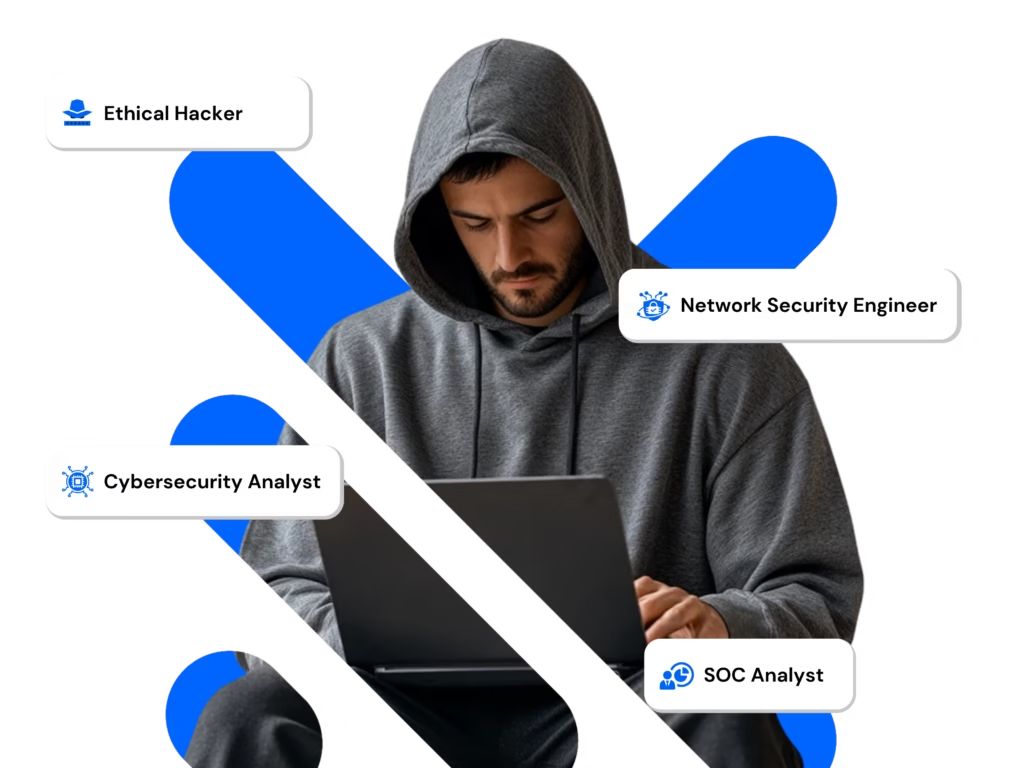- Cyber Security
- CND
- EC-Council
Certified Network Defender (CND)
Fortifying Digital Fortresses: Mastering the Art of Network Defender
Safeguarding Networks against Cyber Threats with Senseacademy





Trusted by over 30K students
- Aligned with the Latest Certified Certified Network Defender (CND) Content Outline
- Proven Step-by-Step Blueprint for Certified Network Defender (CND) Expert Success
- World's #1 Certified Network Defender (CND) Prep to Pass in Your First Attempt


Ready for Rapid Career Growth? Our Learning Advisors Are Here to Help!
Enhance Team Skills with Our Corporate and In-House Training Programs
Overview
Certified Network Defender (CND) Certification training
Sense Academy’s Certified Network Defender (C|ND) is a vital vendor-neutral network security certification for all IT and systems administrator who desires to work with a secure mentality. Students will study the serious abilities essential to guard their networks and working environments through OT, applications, and cloud infrastructure endpoints, mobile and local networks. The certified Network Defender program intended by industry experts arranges network defenders with strategic maintain secure networks, develop, enabling them to design, operational network security capabilities, technological, and network defenders with strategic.
Industry Demand
Unlock Opportunities: Over Certified Network Defender (CND) Jobs Available by 2030!
Certified Network Defenders (CND) is in high demand as organizations prioritize the security of their networks against escalating cyber threats. These professionals specialize in protecting, detecting, and responding to network security breaches, ensuring the integrity and availability of network infrastructure. Their expertise in network defense, incident response, and security protocols is crucial for maintaining robust security postures in various industries.
CND-certified professionals can expect competitive salaries, typically ranging from $60,000 to $110,000 per year, depending on factors such as experience, location, and industry. As cyber threats continue to grow in complexity, the demand for skilled network defenders is expected to rise, offering promising career opportunities in this essential area of cybersecurity.
Why Choose Us?
Discover the Senseacademy Advantage
Expert Instructors
Learn from industry experts with real-world experience
Flexibility
Learning formats, including online courses, workshops.
Supportive community
Connect with peers,mentors, and professionals for success
Hands-On Experience
Our courses include practical labs, real-world projects etc.
High Success Rates
Our students excel in certification and job placement
Access Recorded Sessions
Access recorded sessions anytime for flexible review.
Certified Network Defender (CND) COURSE PRICING
Tuition Fee
Best Seller
Live Online Classroom
Learn in expert-led live sessions
Solid Experiential Learning
- 40 Contact Hrs with Live Training
- Free On-Demand Course by Industry Experts
- Practice exams and additional resources
-
₹ 24,750₹ 22,500
Self-Paced Learning
Learn at your own pace
Solid Experiential Learning
- 40 Contact Hrs with Live Training
- Practice exams and additional resources
-
₹ 22,500₹ 19,250
WHAT YOU’LL LEARN IN THIS training
Learning Objectives
Scheduling and managing network security for organizations
Identifying security risks, threats, and vulnerabilities
Confirming obedience with regulatory standards
Crafty and applying network security policies
Implementing security values in dispersed and mobile computing surroundings
PREREQUISITES FOR this CERTIFICATION TRAINING
Prerequisites and Eligibility
- Knowledge of networking concepts, protocols, and architectures.
- Practical experience or a role in network security or a related field.
- Awareness of network infrastructure and its components.
- Familiarity with common network protocols and their functionalities.
WHO SHOULD ATTEND THis COURSE ONLINE
Who This Course Is For?
- Network Administrators
- Network Security Administrators
- Network Security Engineers
- Cybersecurity Analysts
- Security Operations Center (SOC) Analysts
- Network Security Technicians
- Security Consultants
COURSE SYLLABUS
Curriculum
- This module introduces you to different network-based attacks faced by the organization to understand their working and develop defense strategies.
- It involves developing or updating security infrastructure and continuously monitoring networks for any suspicious actions or unauthorized access
- Implementing authentication and protection controls for user verification to avoid theft of sensitive information or data. Introducing the concept of zero trust and its effectiveness in maintaining a better security posture
- Implementation and management of perimeter devices like firewalls, Intrusion Detection Systems, Intrusion Prevention Systems
- Security of end-user devices and entry points by implying endpoint security on Windows devices
- Securing entry points or end-user devices by ensuring endpoint security on Linux devices
- Securing entry points or end-user devices by ensuring endpoint security on mobile devices
- Fundamentals of IoT, IoT threats and security using endpoint security implementation
- Understanding the methodologies of administrative application security and its importance to minimize the security-related vulnerabilities in the application
- Implementing policies to safeguard data from unauthorized access using various techniques like encryption, hashing, tokenization, and other key management practices Concept of data storage, data classification, data masking, retention and destruction
- In-depth understanding of virtualization, related threats, and security Essentials of software-defined network (SDN) security, network function virtualization (NFV) security
- Introduction to cloud computing, threats, challenges and security across cloud platforms, concepts of container security, Docker security, and Kubernetes security
- Understanding of wireless network security essentials, threats, attacks, and countermeasures
- Analysis and monitoring of logs from various perimeter network devices to identify any anomalies in the traffic.
Analysing the events generated by various devices in the network to identify signs of any suspicious activity or a potential incident
- Understanding of incident management response process and methodologies to be followed in case of security incidents Understanding of forensics investigation techniques and tools used for analysis
- Understanding the importance of BCP and DR, related concepts and procedures required to allow smooth functioning of operations in case of a disaster
- Risk management process analysing various risks that the organization is susceptible to and developing policies to manage them
- Analysing the threats and attack vectors to develop solutions for their countermeasures
- Developing a proactive approach by understanding various frameworks aiding in threat intelligence to anticipate the kinds of attacks hackers could use to gain access to the network.
Information Related To Exam
Exam Information
- Certification Code – 312-38 (ECC EXAM)
- Exam Format- Multiple Choice
- Minimum Score Required – 100
- Delivery Method – ECC EXAM
- Exam Duration – 4 hours
- Minimum Score required- 60% to 85%
Achieve Excellence: Earn the Coveted Certified Network Defender (CND) Certified Certification Today!

Certified Network Defender (CND) COURSE REVIEWS
Our Learners Love Us
4.6/5 Rated by 2000+ Learners
4.6/5 Rated by 2000+ Learners
4.6/5 Rated by 2000+ Learners
Certified Network Defender (CND) CERTIFICATION FAQS
Frequently Asked Questions
The CND certification validates skills and knowledge in protecting, detecting, and responding to network threats. It equips cybersecurity professionals with the expertise needed to secure and manage network infrastructures effectively.
The CND certification is ideal for network administrators, network security administrators, network security engineers, and anyone involved in network defense and management. It is also suitable for individuals looking to advance their careers in network security.
To pursue the CND certification, candidates should have a basic understanding of networking concepts and some experience in network administration or security. Previous certifications like CompTIA Network+ or equivalent knowledge are recommended but not mandatory.
The CND certification course covers a wide range of topics, including network security principles, network security threats and attacks, network defense techniques, network perimeter security, secure VPN implementation; secure IDS/IPS implementation, and incident response. It also addresses the importance of network security policies and procedures in maintaining a secure network environment.
RECOMMENDED COURSES.
Learners Also Enrolled For
Chief Information Security Officer | CCISO
- Recorded Sessions
- 45 Hours
- Hybrid
- Exam Voucher










